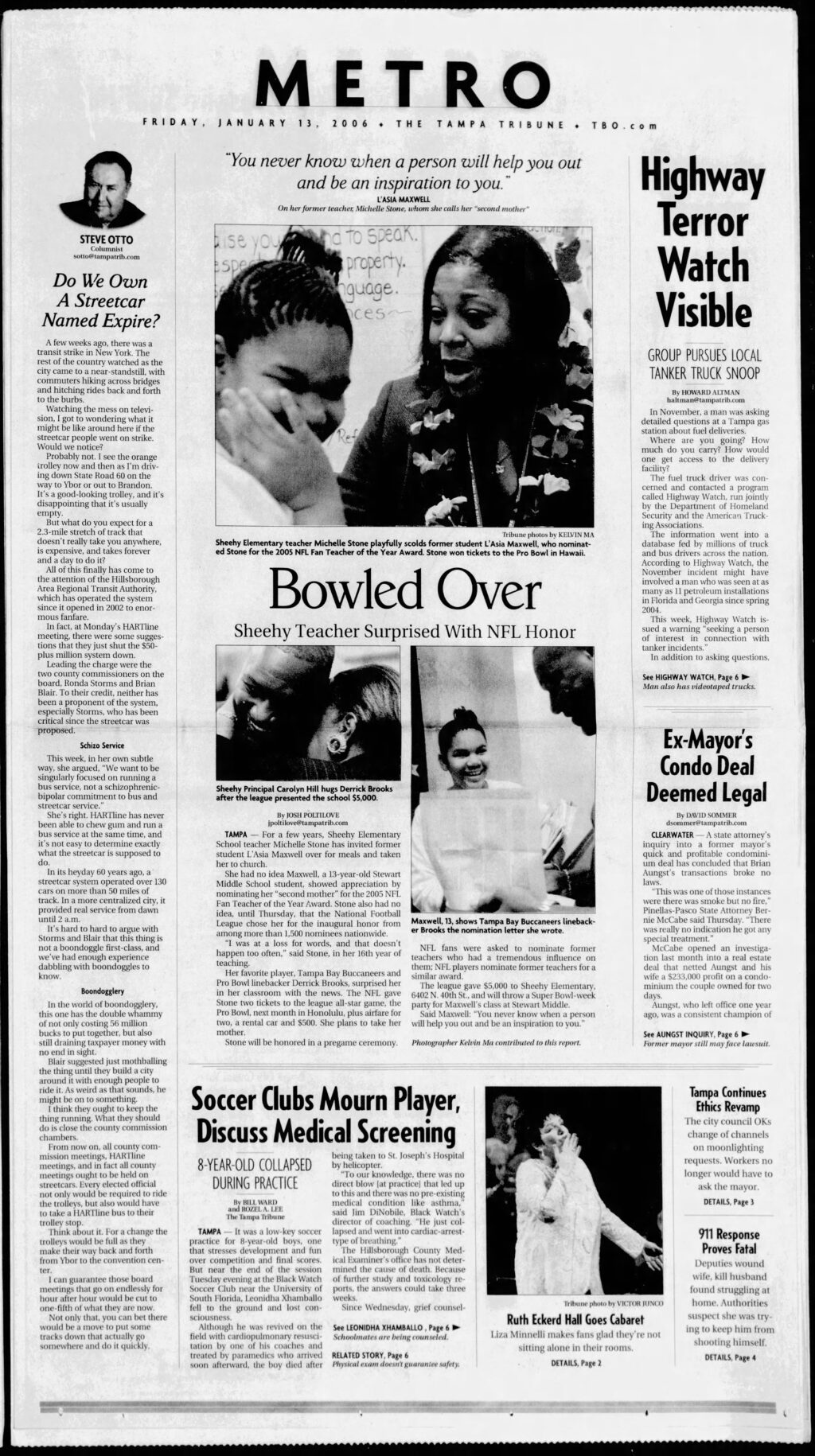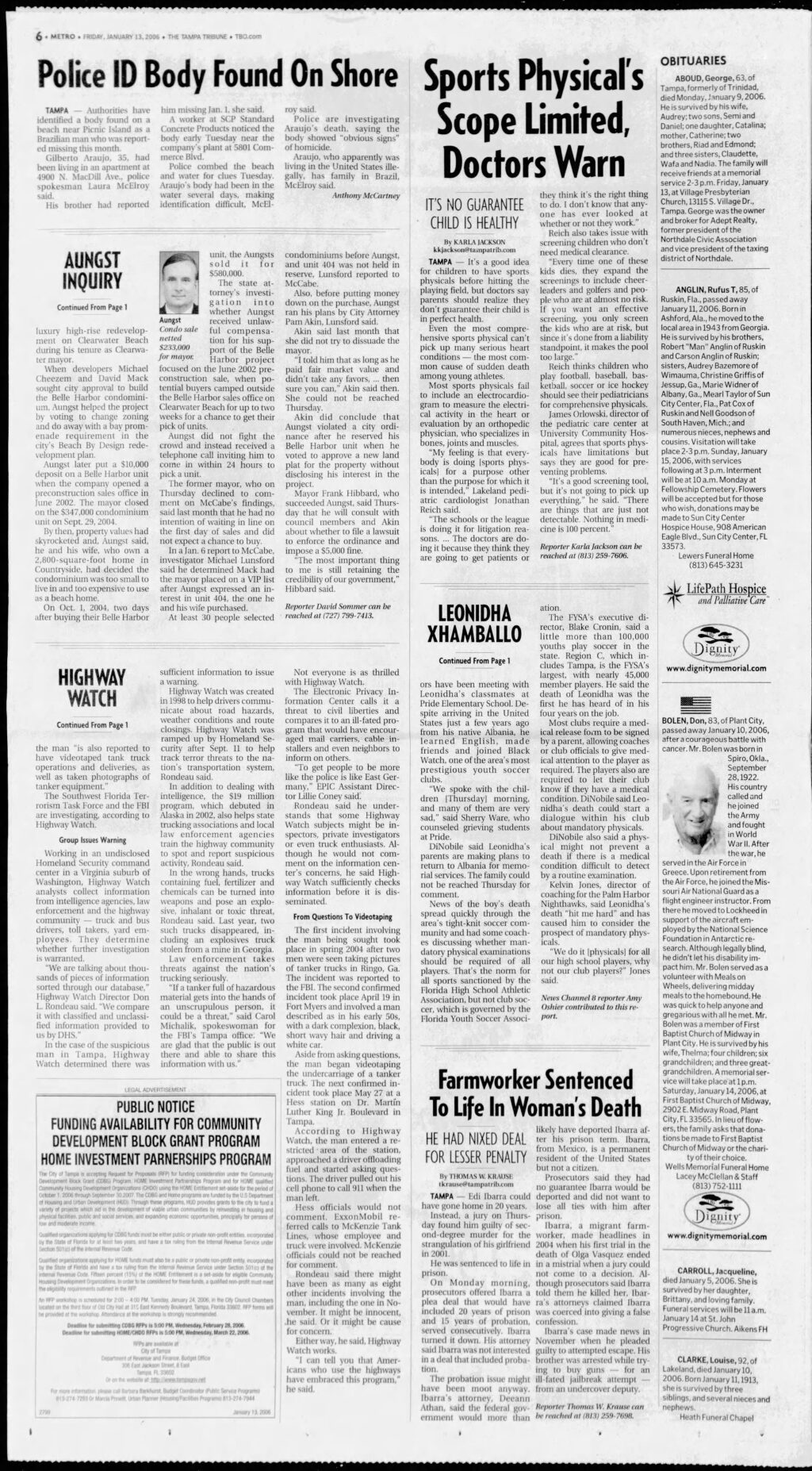Group Pursues Local Tanker Truck Snoop
In November, a man was asking detailed questions at a Tampa gas station about fuel deliveries.
Where are you going? How much do you carry? How would one get access to the delivery facility?
The fuel truck driver was concerned and contacted a program called Highway Watch, run jointly by the Department of Homeland Security and the American Trucking Associations.
The information went into a database fed by millions of truck and bus drivers across the nation. According to Highway Watch, the November incident might have involved a man who was seen at as many as 11 petroleum installations in Florida and Georgia since spring 2004.
This week, Highway Watch issued a warning “seeking a person of interest in connection with tanker incidents.”
In addition to asking questions the man “is also reported to have videotaped tank truck operations and deliveries, as well as taken photographs of tanker equipment.”
The Southwest Florida Terrorism Task Force and the FBI are investigating, according to Highway Watch.
Group Issues Warning
Working in an undisclosed Homeland Security command center in a Virginia suburb of Washington, Highway Watch analysts collect information from intelligence agencies, law enforcement and the highway community — truck and bus drivers, toll takers, yard employees. They determine whether further investigation is warranted.
“We are talking about thousands of pieces of information sorted through our database,” Highway Watch Director Don L. Rondeau said. “We compare it with classified and unclassified information provided to us by DHS.”
In the case of the suspicious man in Tampa, Highway Watch determined there was sufficient information to issue a warning.
Highway Watch was created in 1998 to help drivers communicate about road hazards, weather conditions and route closings. Highway Watch was ramped up by Homeland Security after Sept. 11 to help track terror threats to the nation’s transportation system, Rondeau said.
In addition to dealing with intelligence, the $19 million program, which debute in Alaska in 2002, also helps state trucking associations and local law enforcement agencies train the highway community to spot and report suspicious activity, Rondeau said.
In the wrong hands, trucks containing fuel, fertilizer and chemicals can be turned into weapons and pose an explosive, inhalant or toxic threat, Rondeau said. Last year, two such trucks disappeared, including an explosives truck stolen from a mine in Georgia.
Law enforcement takes threats against the nation’s trucking seriously.
“If a tanker full of hazardous material gets into the hands of an unscrupulous person, it could be a threat,” said Carol Michalik, spokeswoman for the FBI’s Tampa office. “We are glad that the public is out there and able to share this information with us.”
Not everyone is thrilled with Highway Watch.
The Electronic Privacy Information Center calls it a threat to civil liberties and compares it to an ill-fated program that would have encouraged mail carriers, cable installers and even neighbors to inform on others.
“To get people to be more like the police is like East Germany,” EPIC Assistant Director Lillie Coney said.
Rondeau said he understands that some Highway Watch subjects might be inspectors, private investigators or even truck enthusiasts. Although he would not comment on the information center’s concerns, he said Highway Watch sufficiently checks information before it is disseminated.
From Questions to Videotaping
The first incident involving the man being sought took place in spring 2004 after two men were seen taking pictures of tanker trucks in Ringo, Ga. The incident was reported to the FBI. The second confirmed incident took place April 19 in Fort Myers and involved a man described as in his early 50s, with a dark complexion, black, short wavy hair and driving a white car.
Aside from asking questions, the man began videotaping the undercarriage of a tanker truck. The next confirmed incident took place May 27 at a Hess station on Dr. Martin Luther King Jr. Boulevard in Tampa.
According to Highway Watch, the man entered a restricted area of the station, approached a driver offloading fuel and started asking questions. The driver pulled out his cell phone to call 911 when the man left.
Hess officials would not comment. ExxonMobil referred calls to McKenzie Tank Lines, whose employee and truck were involved. McKenzie officials could not be reached for comment.
Rondeau said there might have been as many as eight other incidents involving the man, including the one in November. It might be innocent, he said. Or it might be cause for concern.
Either way, he said, Highway Watch works.
“I can tell you that Americans who use the highways have embraced this program,” he said.


